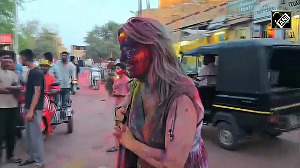 |
'We've created a society where if you don't like what someone is saying -- and if you have police power at your disposal or battalions of thin-skinned people willing to riot on your behalf -- then you can harass someone with arrest at one end of the spectrum and three years in jail at the other.'
Karuna Nundy, one of India's dynamic young lawyers, discusses the recent case where two young women were arrested for a Facebook post, with Rediff.com's Abhishek Mande.
After a young woman from Palghar, Maharashtra, was arrested for posting an apparently offensive message on Facebook and another for 'liking' it, the nation erupted in protest.
Section 66A of the Information Technology Act, one of the laws under which the women were arrested, is the latest law to come under fire.
Karuna Nundy is a vocal opponent of the IT Act, and suggests that it was a case of bad drafting and needs to be fixed.
Nundy, 36, practises in the Supreme Court where she is leading litigation against the Government of India, the government of Madhya Pradesh, the Union Carbide Corporation and the Dow Chemicals Corporation concerning the rights of the Bhopal Gas Tragedy victims.
One of India's dynamic young lawyers, the Cambridge and Columbia Law School-educated Nundy also advises various United Nations agencies as well as governments of other countries so as to conform their legal systems to international and constitutional legal standards.
Besides having argued cases involving the rights of alleged terrorists, mentally ill people and class actions on sexual harassment Nundy has also been on the National Advisory Council's drafting committee for the Right to Food Bill. She has also advised on the Communal Violence Bill and the Mental Health Care Bill.
She spoke on the telephone with Rediff.com's Abhishek Mande.
What issues do you have with Section 66A of the Information Technology Act?
Section 66A is very broad, it's also unclear. It includes, for instance 'any electronic mail or electronic mail message for the purpose of causing annoyance or inconvenience', so an 'annoying' Facebook post, tweet or e-mail could send you to jail for three years.
Look at the cases in which it has been applied: Against a man who tweeted about Karti Chidambaram; Aseem Trivedi who drew a cartoon that was, at best, tasteless; and now, the young Palghar woman whose Facebook post expressed an innocuous opinion on the city-wide bandh, and her friend who pressed a single button to 'like' the post.
When truth is spoken to power and some annoyance is caused, then the powerful have framed laws in such a way that all they need to do is click its machinery into motion.
The police now has the power to arrest for such 'annoyance' or 'inconvenience' without a warrant and at the first instance they get to decide on what is 'annoying', 'inconvenient', 'grossly offensive' or 'menacing'.
Don't forget that Section 66A of the IT Act is usually used along with IPC (Indian Penal Code) provisions.
The IPC criminal laws were created by the British Raj to suppress revolution in an oppressed population.
Bizarrely, independent democratic governments post 1947, have tightened legal restrictions on speech and given themselves more and more power to shut people up.
We've created a society where if you don't like what someone is saying -- and if you have police power at your disposal or battalions of thin-skinned people willing to riot on your behalf -- then you can harass someone with arrest at one end of the spectrum and three years in jail at the other.
We are lucky that our media is nonetheless more independent than many countries, but it's getting less and less so.
Free speech is a main artery of a healthy democracy, one that carries the opinions and problems of citizens to the government, the courts and to other citizens.
When you cut that off, you are left only with voices that congratulate those in power.
The central and state governments over the last few years have been extremely oppressive of free speech, not just in the examples I've cited above, but also of the Koodankulam protests, throwing Anna Hazare in jail (whatever you may think of his politics), indicating that Salman Rushdie could not be given protection against marauding mobs if he came here.
And they haven't got nearly enough flak for cauterising this artery of democracy.
The Palghar Facebook arrests are such a stark demonstration of the problems. Despite the Srikrishna Commission, most of those who have incited fundamentalist violence in Mumbai over the years have not been prosecuted.
In most cases permission was not granted to prosecute Mr Thackeray in most of the cases against him. The stage is set up in such a way, that the weakest target is gagged to 'maintain law and order'.
The interesting thing about this girl's post is that it was respectful and quite reasonable; she wasn't saying anything dramatic at all.
What does this incident say about the fear flowing across deleted Facebook posts and diluted tweets because of the fear caused by a party that is anti-South Indian, anti-North Indian, anti-Muslim, anti-Communist, anti-Valentine's Day?
More importantly, what does it say about our governments who can't get it together to protect us from bullies, but instead seek to throw us in jail?
Where do you see this issue heading? The Palghar incident is not the first and it possibly won't be the last...
It's unclear. I hope that people are becoming more aware of the anatomy of these restrictions; of the fact that various lifelines of democracy are slowly being strangulated, some are being cut off.
But this is also the government that passed the Right to Information Act and resisted internal pressure to water it down.
Ideally, there would be an increasing voice against the repeal of Section 66A and new laws enacted in its place that are in line with our Constitutional principles.
I see the huge support to Shaheen Dhada and Renu Srinivasan as an opportunity to repair the damage that has been caused so far.
Are you really suggesting that this might happen given the past record of our governments?
Look, I am an optimist and a democrat. So I would like to think there is a possibility. What has been happening is extreme; it is possible that the central government or the courts will sit up and take note.
One of the feelings prevalent today is that what is happening today has shades of the Emergency era. Would you say that is perhaps being a tad dramatic?
There are aspects of the Emergency, but let us not forget the freedoms that we do have. Also sometimes, I suspect laws are a matter of bad drafting and then they get misused...
Would you say this is one such case?
I can't say; I wasn't in the drafting process. But the most benign interpretation would be that the law was negligently drafted, without enough consultation and wasn't intended to be so draconian, in which case the government will show its good faith and take steps to fix it.
Here's why I am sounding gloomy: much before the Palghar story erupted, I was about to react to something someone said about Mr Thackeray on Facebook.
I didn't because I wasn't sure what sort of trouble it'd land me in. It bothered me then; it bothers me now...
In the jurisprudence of free speech that's called the 'chilling effect'.
What happens when you have an arrest like the one in Palghar is that the rest of the media -- mainstream and social -- starts to edit itself.
Newspapers and television because they have assets they wishes to protect from vandalism and corporate structures that tend towards the conservative, plus they don't have access to security from the State when required.
Social media self-edits because individuals can't stand against mobs and unfair criminal laws by themselves; the power differential is far too much.
So it takes a superhuman amount of courage to overcome fear of the State or fear of violence by fundamentalists.
Do you believe the mainstream media is doing enough to raise awareness or drumming up support for...?
For its own real survival, the mainstream media needs to go on a campaign on free speech laws. The Hindu has done quite well on it; quite a lot of their reporting has been quite clear and solid. I wouldn't tar them all with the same brush...
... then again you could well just be talking of an exception to the rule.
Well, yes there has been a lot of adulation in the media... Even in the kind of reporting... why would you want to report, let's say Ram Gopal Varma's views or Amitabh Bachchan's views for that matter?
What you choose to report is important. But at least these Facebook arrests have woken them up!
Is it then time for some of us to perhaps sit up and take note?
Yes, it is time for the newspapers and magazines and television channels to recognise they will be reduced to being stenographers for those in power unless they band together and stand up, begin a campaign to repeal these laws.
Of course, if they are to do it responsibly they also need to sort out how defamatory or even just incorrect articles can be dealt with in a fair and expeditious way that is in keeping free speech and civil liberty.
Photograph of Karuna Nundy: Olivia Arthur/Magnum Photos, reproduced with Ms Nundy's kind permission.







 © 2025
© 2025